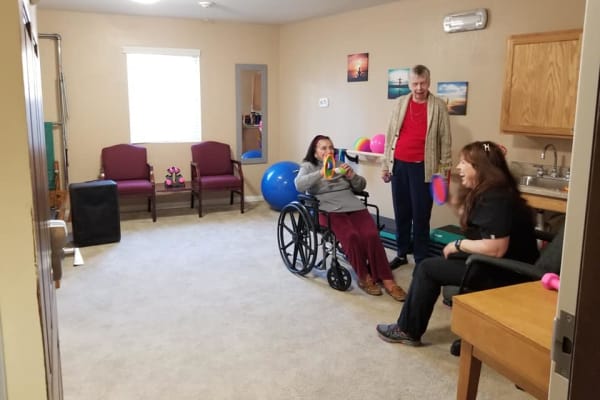Pet Therapy For Assisted Living Seniors
Pets are an important part of many people’s every day life. Having a dog or cat as a child is almost considered a rite of passage and often teaches us our first responsibility. Many families have a family pet as kids grow into teenagers. A pet can often be a young adult’s first roommate when they are out on their own. And many, many seniors have pets to add companionship and help cope with loneliness later in life. Pet Therapy takes these life long experiences and converts the visitation of a pet into healthcare. Pet Therapy animals typically visit with patients in recovery, people with intellectual disabilities, seniors living with Alzheimer’s, students, veterans with PTSD, people who have experienced crisis events, and those approaching end of life, with the goal of improving human health and well-being through the human-animal bond.
What is Pet Therapy for the Elderly?
The companionship of a pet can be an invaluable tool bringing continued purpose and engagement for people of all ages, and especially for seniors. Spending time with a pet is a meaningful way to combat loneliness and isolation, bringing comfort and companionship while reducing stress and promoting overall health and wellness. Anyone who has spent time with a loving golden retriever or cuddled with a purring cat knows that animals have a powerful effect on people. A pet companion can bring many health benefits to seniors, even if seniors are unable to properly care for a pet. Through pet therapy animals interact with seniors to help improve their quality of life.
How Does Pet Therapy Work?
How a pet becomes a therapy animal is very important. Not just any dog or cat can be a true therapy companion, there is specialized training and instruction to ensure that both the animal and the senior are safe. Therapy dog candidates are naturally calm, friendly, and affectionate to strangers. They are also well-trained in basic obedience, and easily adaptable to novel noises, places, smells, food, and equipment. Most therapy dog organizations also require that dogs be healthy and well-groomed, with regular health and wellness check-ups.
The Benefits of Pet Therapy
Just as our Wellness programs at Ridgeline are beneficial to our seniors, so too is pet therapy. The benefits of pet therapy start with warm touch, a smile, and can end with both physical and emotional benefits for the senior. The physical benefits are measurable such as blood pressure, increased mobility and more. The emotional benefits start with interaction, reduced isolation, and eventually a feeling of being loved.
Physical Benefits of Pet Therapy
The physical benefits of Pet Therapy are well known, but we wanted to discuss a couple of the more important advantages.
-
Increased mobility – The physical act of petting, holding, bending over and picking up a therapy animal increases strength, mobility and range of motion. Many seniors find exercise or exercise classes to be boring, or are not interesting, but ask them to hold a twenty pound dog for an hour, and they may receive the benefits of more exercise then they would in a class.
-
Lower blood pressure - The physical act of petting an animal actually produces an automatic relaxation response, that in turns lowers blood pressure. Lowered blood pressure can reduce the risk of heart disease, heart attacks, and stroke, AND improves cardiovascular health.
-
Sensory stimulation – Interacting with animals can stimulate all of a senior’s senses. From the obvious sense of touch in petting or holding the animals, to the action of watching others interact with the same animal. Watching an animal perform tricks or bring joy to another resident, can fill a senior with happiness.
Emotional & Mental Benefits of Pet Therapy
As important as the physical benefits of pet therapy are, the emotional and mental benefits at time can be more important and definitely more easily observed.
-
Interacting with an animal decreases isolation and depression. Some residents rarely leave their rooms for anything other than meals. They are uninterested in activities, and become further isolated. Pet therapy has shown to be nearly universal in creating joyous moments for seniors to interact with each other.
-
Pet Therapy causes many to feel calm, and loved. Pet therapy can cause feeling of peacefulness, provide comfort to those in pain, and will help reduce boredom
-
In seniors with Alzheimer’s Disease or dementia, animals can bridge communication gaps, often bringing non-verbal residents to produce sounds of joy and laughter. Pets can break through barriers of memory and communication. Pets can also lower anxiety and decrease agitation among residents
Pet Visitation Therapy at Ridgeline
Smaller pets are welcome at Ridgeline communities. Residents can benefit from moving in with their current owned pets living with them at our community. In fact those animal residents become part of our family and are known to all throughout the community. Families are encouraged to bring (approved) family pets in for visits. (Please check with the administrator before you do!) Finally, one of our favorite activities is to bring approved pet therapy animals into the community as an activity. Over the years, senior living communities have welcomed penguins from the local zoo, a therapy horse, and birds in for visits. If you have any additional questions regarding our pet policy, don't hesitate to reach out to your local Ridgeline community!


